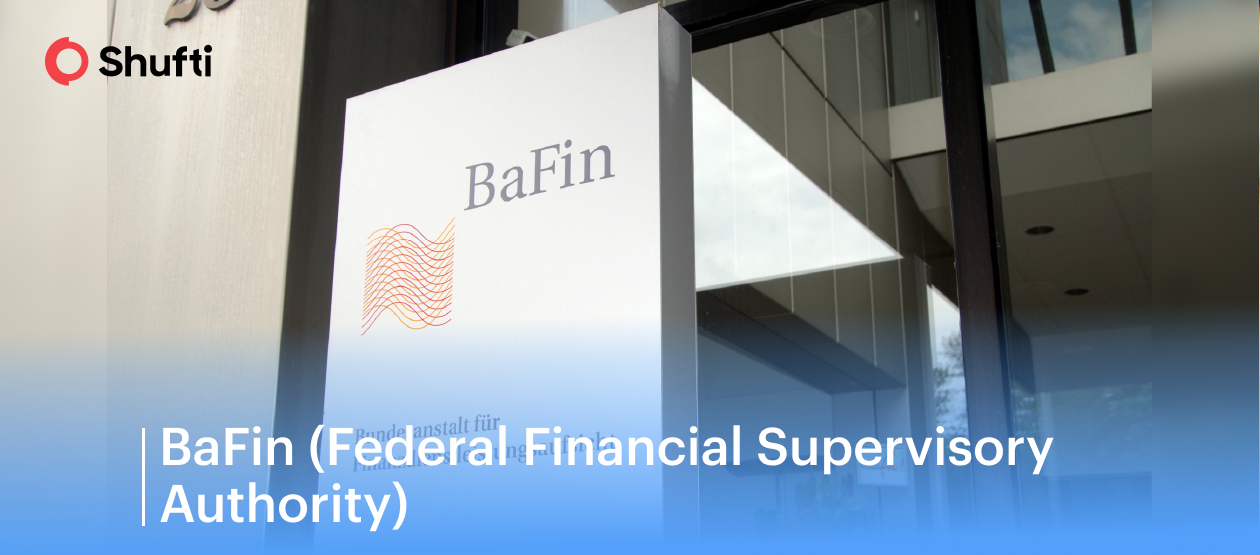BaFin (Federal Financial Supervisory Authority)

Financial crime continues to threaten markets around the world, affecting banks, fintechs, and corporations alike. In response, governments have stepped up efforts to build stronger regulatory systems. One of the most prominent authorities on the global stage is Germany’s Federal Financial Supervisory Authority, also known as BaFin.
A Quick Overview of BaFin
Founded in 2002, BaFin oversees Germany’s financial system with a strong focus on preventing money laundering, terrorist financing, and financial misconduct. Based in Frankfurt and Bonn, it operates independently but reports directly to Germany’s Federal Ministry of Finance.
BaFin was formed through the merger of three key regulators: the Banking Supervisory Office, the Insurance Supervisory Office, and the Securities Supervisory Office. Today, it regulates a wide range of financial institutions including banks, insurers, fintechs, and crypto asset service providers.
As of 2021, BaFin is led by Mark Branson, the former CEO of Switzerland’s FINMA. He works alongside four executive directors to steer the agency’s strategic and supervisory efforts.
What Does BaFin Do?
BaFin serves as the central authority for financial supervision in Germany, helping ensure market integrity, consumer protection, and industry-wide compliance with financial laws. Its role is not just local but global, contributing to the international fight against financial crimes through standards like the FATF’s 40 Recommendations.
Key functions include:
- Supervising financial markets and financial service providers
- Licensing new banks and financial companies
- Enforcing transparency and stability in the financial system
- Investigating suspicious transactions and market abuse
- Collaborating with the Deutsche Bundesbank to monitor financial stability
BaFin also acts as a mediator between financial institutions and the German government, ensuring the flow of regulatory information and accountability.
BaFin’s Role in AML/CFT Compliance
At the center of BaFin’s mission is anti-money laundering (AML) and countering the financing of terrorism (CFT). It plays a pivotal role in implementing Germany’s obligations as a member of the Financial Action Task Force (FATF), pushing financial entities to meet the highest global compliance standards.
BaFin’s Department for the Prevention of Money Laundering enforces Section 50 of the Money Laundering Act and mandates that financial institutions:
- Perform KYC checks during onboarding
- Apply a risk-based AML/CFT program
- Screen customers against PEP (Politically Exposed Person) and sanctions lists
- Monitor both new and existing customers using adverse media checks
- Appoint a designated AML compliance officer
These measures are essential to protect financial systems from abuse and to uphold collective trust in the global economy.
BaFin and the Crypto Sector
BaFin has also taken a proactive approach to supervising crypto asset service providers, making Germany one of the few countries with a clear licensing framework for virtual asset businesses. Beginning in 2020, crypto custodians operating in Germany must obtain authorization from BaFin, ensuring their services meet the same stringent AML/CFT requirements as traditional financial institutions.
This regulatory clarity has positioned Germany as a leading jurisdiction for crypto compliance in Europe, particularly in light of the EU’s Markets in Crypto-Assets (MiCA) Regulations, which works to standardize crypto oversight across the bloc.
Global Trends: The Evolving Role of Financial Supervisors
Globally, financial regulators are moving toward more tech-focused, risk-based approaches. There is a growing emphasis on:
- AI-driven AML tools to detect suspicious patterns in real-time
- Public-private partnerships to share intelligence and increase enforcement capacity
- Stronger oversight of virtual assets, fintechs, and decentralized finance (DeFi) platforms
Regulators like BaFin are also responding to new threats, including deepfake-enabled fraud, synthetic identities, and cross-border financial crimes. This shift requires dynamic frameworks that balance innovation with security, which BaFin continues to pursue.
Final Thoughts
BaFin’s comprehensive oversight, commitment to AML/CFT compliance, and forward-looking regulatory stance make it a key player in global financial governance. Whether it’s monitoring traditional banks or setting new standards for growing sectors like crypto, BaFin’s influence is helping shape a more secure, transparent financial future.

 Explore Now
Explore Now






